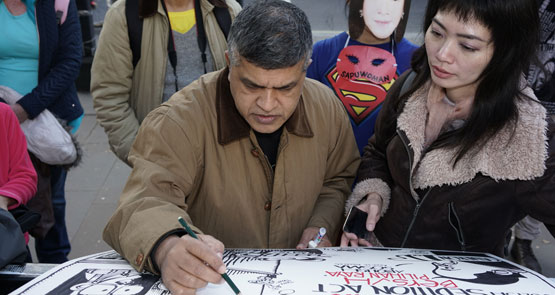
Zunar draws at a protest in London
Malaysian cartoonist Zunar is currently travelling to New York City to receive an International Press Freedom Award. But when he returns to Malaysia next month, he will face nine charges under Malaysia’s Sedition Act and, if convicted, a 43-year prison sentence.
Zunar, the pen name of Zulkiflee Anwar Ulhaque, satirises the legitimacy of the United Malays National Organisation (UMNO), the political party that has ruled Malaysia for 58 years, through his cartoons. Last week he addressed an audience in NSW Parliament House on Malaysia’s suppression of free speech. In introducing him, Australia’s director at Human Rights Watch, Elaine Pearson, described Malaysia’s human rights in “free fall”. The UMNO, armed with legislative tools to suppress civil and political dissent, including the Sedition Act, opposes outspoken politicians, artists, and bloggers.
Zunar’s nine charges specifically relate to a series of tweets posted in February criticising the judiciary. Pearson rhetorically asked: what does a government have to fear to repress 140 characters? Why do Zunar’s cartoons generate such close government scrutiny?
The British enacted the Sedition Act in 1948 to quash opposition to colonial rule and silence critics. In 2015, however, sedition is broadly construed to capture expression that merely “has a tendency” to cause ill will, hatred, disaffection or discontent. The Malaysian government enforces the act under the guise of preserving ethnic relations.
Malaysia is indeed an ethnically diverse democracy: it is a comparatively developed country, internationally renowned for its 88-storey Petronas Twin Towers, extravagant shopping malls and Penang’s unrivalled street food. However, these all conceal Malaysia’s internal unrest and corruption. And it is the underlying corruption that attracted Zunar’s pen.
Formally educated in science and employed as a laboratory technician, Zunar published his first cartoon when he was just 12. In 2010, the Malaysian government banned his political cartoon publications, claiming their contents were “prejudicial to the public order”.
According to Zunar, three hours after receiving his cartoon book from the publisher, the police arrested him and confiscated his drawings under the Sedition Act. When summoned to court, Zunar, representing himself, candidly asked the judge whether the police had read the allegedly seditious book. They had not. The judge ordered that the police go and read the book and return if they still found it to be so. Malaysia’s Federal Court will hear the matter following the government obtaining permission to challenge the appellate court’s decision to overturn the original ban.
Zunar fiercely defends his right to free speech. He told his NSW audience that although government could ban his books and publications, it could not ban his mind. His printing houses have been raided and his books are not publicly available in Malaysia. But he will keep drawing.
“To stop me, you will have to stop ink supply to Malaysia!” he joked.
Zunar refers to his drawings as the “people’s cartoons”. He says that he doesn’t care about the raids or the bands. As a cartoonist, it is his duty.
“My talent is not a gift. It is a responsibility,” he said. Zunar focuses on the fortunate position he is in and explains why confronting these charges is important: “If I don’t go back, the government wins.”
He goes on to say that the Sedition Act is designed to silence the population and give the police sweeping powers. It overlooks article 10 of the federal constitution, which guarantees Malaysians freedom of speech, association and assembly.
“Seeking [political] asylum is beneficial for me. But not for Malaysia … Everyone has fear, but responsibility is bigger than any fear.”
Zunar is not alone in his vocal opposition. Corrupt regimes cannot persevere without people speaking out.
In 2014, I spent three months as a paralegal in a firm in Desa Sri Hartamas, Kuala Lumpur. Following attendance at a hearing for a death in custody matter, I fortuitously chatted with high-profile lawyer Gobind Singh. His late father and former opposition leader, Karpal Singh, was subject to the first sedition prosecution after Najib’s election. Gobind Singh is now chairman of the Democratic Action Party (DAP) National Legal Bureau and is openly critical of the government’s behaviour.
During this short period, I met solicitors, parliamentarians and activists. Several had obtained their masters qualifications from Oxford, Hong Kong University and Bristol. And all returned to Malaysia to fight for change through their respective professions — Gobind Singh through his actions in parliament and in the courtroom, suburban law firms through their work on pro-bono public interest matters, and Zunar through his ink.
Zunar says that Malaysia is “sprinting backwards.” He asks that the Australian public talk about his cartoons, his country and take steps to understand Malaysia’s political and cultural climate beyond her distracting skylines.
In late November, Prime Minister Malcolm Turnbull will attend the East Asia Summit in Kuala Lumpur to discuss economic and political challenges facing the region. With both countries signatories to the controversial Trans-Pacific Partnership free-trade agreement, Malaysia’s crackdown on free speech is unlikely to appear on the agenda. Zunar, however, is determined to highlight Malaysia’s shortcomings to the international community to move it forward.
“How can I be neutral, when even my pen has a stand?”







It helps MOST intelligent people realise how fortunate we are to live in one of the Western Democracies which have done so much to enhance free speech, doesn’t it.
We can but hope the efforts of emotional Faux Progressives don’t endanger this any more than they already have.
Both Mary and Michael are worthy representatives of their craft.
Like stand-up comedians they’re mostly funny and thought-provoking but sometimes rude and offensive and fall flat. You take the good with the bad – if you can’t do that you become PM Morrison – a self-righteous zealot “thou shalt have no other gods before me”.